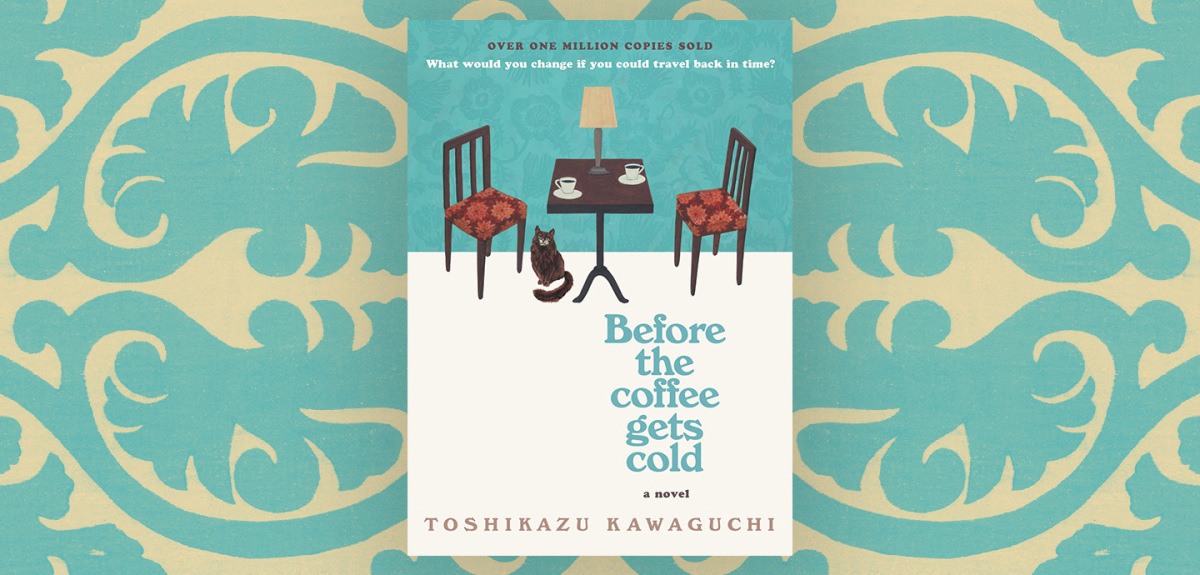[ad_1]
Regret and its effects are no strangers to books. Countless literary works, both fictional and not, explore our innate longing to return to the past, to experience a moment once again, and perhaps find some solace for our aching souls. Yet only time travel fiction allows its characters an opportunity to truly return to where its readers can’t.
Before the Coffee Gets Cold, the debut novel from playwright Toshikazu Kawaguchi, may explore similar ground to its predecessors in the genre, but it inventively limits the mechanics of its time travel to the confines of a small cafe, and is all the more resonant for it. At times, Kawaguchi’s hand is a bit too prominent, but despite the occasional clumsiness, the narrative is deeply moving.
You’ll find no shiny time travel machines – not even a DeLorean – in Before the Coffee Gets Cold. Instead, the novel takes place entirely inside a small basement cafe. Removed from the constraints of linear time, time travel narratives have a propensity to become unwieldy, but Kawaguchi’s greatest contribution to the genre, and perhaps his highest accomplishment in the novel, is the strictness of the rules he imposes on time travel. Kawaguchi limits the action to within the cafe and focuses on the staff and a small number of regular customers.
In addition to the rule about staying in the cafe, a few more narrow in the journey: nothing that happens in the past can change the present, it can only happen in one specific seat, you can only interact with people who have been in the cafe, and there’s a short time limit on each person’s journey. The cafe’s ability is no secret, and yet these strict rules discourage most who learn about it from attempting to travel time themselves. The novel is told over a series of small vignettes, each revolving around a specific trip one of the regulars or staff takes, and housed under a larger narrative that runs throughout, shifting as the cafe and its patrons are changed by their experiences.
This may sound like a very theatrical setup – single location, only a handful of characters – and it is. Kawaguchi’s more prolific medium should come as no surprise to readers of Before the Coffee Gets Cold, and his growing pains in adapting to the novel form is the great shortcoming of the book. Beyond the in-depth description of the cafe itself and of the customers and staff, the action of the book is written in a way deeply reminiscent of stage direction. Exposition seems to be a particular struggle for Kawaguchi, and he often resorts to authorial asides, in which he lays bare the weight of his situations and the depth of his characters.
And yet, this is only a minor blemish on the book. Kawaguchi’s characters are the real stars here, and their empathy for one another is powerful. The first story of four in the novel, about a woman who didn’t discourage her boyfriend from moving to America, is perhaps the weakest of the book, but only for the heights of what’s yet to come.
The next tale, about a man waiting to go back in time to give his wife a letter, is poignant in a way I found more moving than I’d expected. Although the characters are unable to alter the past, the implications they bring forward into the future are real, and the experiences the characters undergo carry real weight on the narrative, which is reflected as the stories progress. While not usually one to shy away from spoilers, I think the real enjoyment of the novel comes not from the way the narratives are told, but the individual narratives in themselves. They are at times a bit sappy, and don’t go in expecting many twists – but this doesn’t take away from the emotional weight behind these moments. If one story doesn’t quite land, one of the others surely will.
This isn’t to say the Kawaguchi has no tricks up his sleeve. In the final story, he defies the rules we’ve by now internalized as much as the characters have, and sends a mother into the future to meet her child. This willingness to play with the form shows how deeply Kawaguchi has explored his own conventions, and the nuance he is capable of bringing to the table. Before the Coffee Gets Cold is mostly conventional, and a little rough around the edges. But it’s also sweet, warm, and moving. Kawaguchi’s characters all have a role to play, and the way they interact with each other, between the staff and the patrons, creates an environment where the reader, too, can feel welcomed and optimistic. The past might be out of reach, even for those who can visit it, but the future is always at hand.

FICTION
Before the Coffee Gets Cold
By Toshikazu Kawaguchi
Hanover Square Press
Published on November 17th, 2020
[ad_2]
Source link
